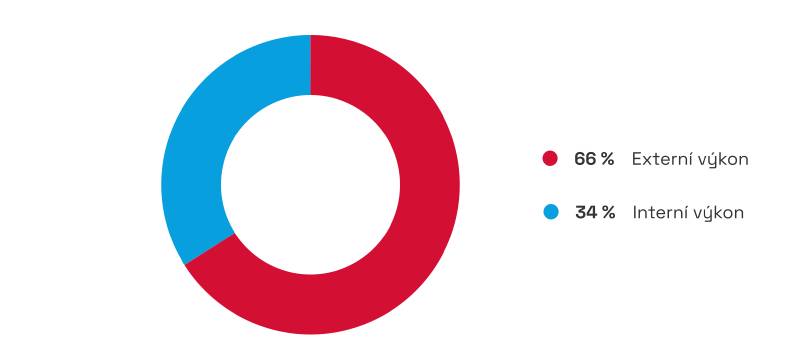PRAGUE, 23 May 2024 - Technical supervision on construction sites is an integral part of the construction process and is perceived as necessary and beneficial by 98 % of the surveyed design offices. Current legislation and the state of construction supervision in practice were discussed at the Conference of Supervisors and Investors in the Construction Industry, organized by CEEC Research at the Ministry of Regional Development.
Technical supervision is to ensure that the construction project is implemented in accordance with the approved project documentation, technical standards and regulations, but it also focuses on the durability of the construction and ensuring safety and quality.
The Building Act requires it for all buildings that are financed with public funds. The private sector uses the services of the Technical Inspection of the Investor (TID) for rational and pragmatic reasons, without being forced to do so by legislation.
External construction supervisors are often preferred, mainly because of their specialised knowledge, their independence and their ability to provide objective assessments. This approach brings a number of benefits, including improved quality and efficiency of project delivery. In turn, in-house executors understand the specific needs and processes of their organization, which can improve coordination and communication within the team. A combination of both approaches is ideal, with external experts bringing an independent perspective and internal staff ensuring seamless information transfer and project continuity.
"Public administration should perceive external supervision not only as a necessary part of the control mechanism, but also as an investment in the long-term sustainability and functionality of infrastructure or construction. Publicly funded construction projects have a huge impact on the economy and society and it is therefore unacceptable that they are implemented without thorough and professional oversight. We are currently facing a situation in the country where the lack of independent supervision has led to repeated instances where costly repairs have to be carried out shortly after the completion of projects. The introduction of compulsory external technical supervision should be seen as a priority step towards improving transparency and efficiency in the public sector. This approach would not only prevent unnecessary mistakes and increased costs in the future, but also strengthen confidence in the public procurement process," says CEEC Research Director on the current state of the use of construction supervision Michal Vacek.

The survey shows that two thirds of companies use external technical supervision. In the Czech Republic, there are often problems with compliance with standards on construction sites and subsequent high repair costs. According to studies by Transparency International, there is a higher level of corruption in public procurement in the Czech Republic compared to some Western countries. This is partly due to a lack of external oversight. Examples such as the reconstruction of the National Museum or the construction of motorways where defects were found after completion demonstrate the need to prevent such situations. Independent supervision is a certain guarantee that unethical practices such as bribes or manipulation of tenders do not occur.
"The benefit and added value of technical supervision lies in the independent and professional control, both technically and financially. Public procurement should rely on the market mechanism not only for the design work and the actual implementation of the work, but also for independent control and supervision activities," he says Petr Suchanek, Technical Director of INFRAM.
According to the interviewed project companies, the main advantages of using external technical supervision lie in the quality of implementation, in representing the interests of the investor, which is closely related to cost control, as well as in transparency and compliance with regulations.
What are the benefits of using external TDIs:

In many countries, it is standard practice for public projects to be under the constant supervision of independent external supervisors. They see the cost of independent supervision as an investment that pays off in the long run by ensuring higher quality and efficiency in construction. For example, in the US, Canada, Australia, and many EU countries, external supervision is standard practice for major public works projects.
Statistics show that states that invest in independent oversight have lower long-term infrastructure maintenance and repair costs. For example, according to the World Bank, preventive measures in the form of quality supervision can save up to 20-30 % in costs associated with subsequent maintenance and repairs.
According to the CEEC Research survey, the following legislative changes would also bring the greatest benefits in the area of technical supervision:
First and foremost, the digitisation of processes. Digitisation is a key step towards modernising and streamlining technical supervision. The introduction of digital tools would allow better tracking of documentation at all stages of the construction process, leading to greater transparency and overall easier access to information. In addition, digitisation would facilitate communication between all stakeholders and allow for faster and more accurate decision-making.
Furthermore, the survey showed that companies would also welcome a tightening of accountability, i.e. that technical supervisors should be more responsible for the quality and safety of construction projects. This could include stricter penalties for non-compliance with regulations and standards, which would motivate building supervisors to work more diligently and improve the overall quality of construction.
The introduction of stricter qualification criteria would ensure that technical supervisors have the appropriate expertise and experience. This could include mandatory certification and regular training to ensure that technical supervisors are always familiar with the latest technologies and practices in the field.
The introduction of independent supervision in public construction projects in the Czech Republic could lead to a significant reduction in overall costs, improved quality and increased transparency in public procurement.
(za)



